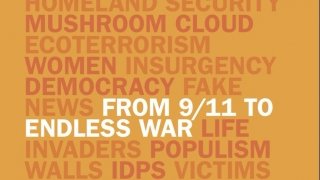
Faculty Café
Celebrating the publication of Globalizing Collateral Language: From 9/11 to Endless War
Edited by John Collins (Professor of Global Studies) and Somdeep Sen ’07 (Associate Professor of International Development Studies, Roskilde University)
Friday, September 10, 2021 at 4:00 p.m. in Sykes Common Room
Published by the University of Georgia Press, Globalizing Collateral Language is an edited volume featuring contributions from several current and former St. Lawrence faculty members (Stephen Barnard, Damon Berry, Chris Buck, Jayantha Jayman, Marina Llorente, Natalia Singer, Cathy Tedford), one St. Lawrence alumnus (George Ciccariello-Maher ’00), and colleagues from MIT, the Universidad Autónoma de Madrid, York University, San Diego State University, and the University of Edinburgh. The book is a follow-up to the 2002 volume Collateral Language: A User’s Guide to America’s New War, edited by John Collins and Ross Glover.
This Faculty Café, part of a week-long series of events marking 20 years since the attacks of September 11, 2001 and the launch of the US-led “War on Terror,” will feature in-person and virtual remarks from several of the contributors to Globalizing Collateral Language.
Refreshments will be served.
From the University of Georgia Press:
“Language is never just a means of communication. It terrorizes. And, especially in times of war, it has the ability to target civilians and generate fear as a means of producing specific political outcomes, most notably the passive and active acceptance of state violence itself. For this reason, the critical examination of language must be a central part of any effort to fight imperialism, militarism, demagoguery, racism, sexism, and other structures of injustice. Globalizing Collateral Language examines the discourse surrounding 9/11 and its entrenchment in global politics and culture.
To interrogate this wartime lexicon of ‘collateral language,’ editors John Collins and Somdeep Sen have assembled a volume of critical essays that explores the long shadow of America's ‘War on Terror’ discourse. They illuminate how this language has now found resonance across the globe and in political projects that have little to do with the ‘War on Terror.’ Two decades after the attacks of September 11, 2001, this book calls on us to resist the tyranny of collateral language at a time when the need for such interventions in the public sphere is more urgent than ever.”
